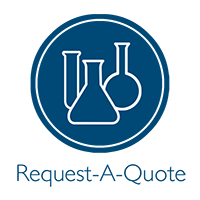This method is used for the determination of toluene. The sample is collected on a diffusive monitor with activated charcoal collection element; monitors must be of known sampling rate for toluene. The sample is then desorbed in 1.5 mL carbon disulfide and analyzed by Gas Chromatography with a flame ionization detection system. The working range is 13 to 660 ppm (50 to 2500 mg/m³ ) for a 4-hour sample. The method is applicable to STEL (short term exposure limit) determinations. The method determines toluene vapor only (not aerosol). Competitive adsorption by water vapor and other volatile organic solvents affects sampler capacity. Note: NIOSH Methods 1500 and 1501 employ active sampling on charcoal tubes with overall sensitivity about the same as this method.
No Obligation Quotation for Analytical Services
If you would like us to provide a quote for laboratory analysis, just provide us with as much information as you can about your project (the more, the better) and we'll provide you a quote via email. As you are searching or browsing our Analytical Guide, you'll see the Request-A-Quote icon... just click on it to start the request process.
| Hold Times, Preservatives, Preps, Collection, Analytical & Documentation | |
|---|---|
| Holding Time: | At least 2 weeks @ 25°C if stored in septum-capped vial. |
| Preservatives: | 25°C. |
| Required Preps: | Diffusive monitor with activated charcoal collection element. |
| Collection Method: | Diffusive monitor with activated charcoal collection element; 15min to 8hrs. |
| Analytical Methodology: | GC/FID |
| Documentation: | |
| Analyte | Formula | CAS Number | Detection Limit | |
|---|---|---|---|---|
| Toluene | C7H8 |
108-88-3 |
0.01 |
mg |
* The analytes and detection limits listed for each method represent the typical detection limits and analytes reported for that particular method. Keep in mind that analyte lists may vary from laboratory to laboratory. Detection limits may also vary from lab to lab and are dependent upon the sample size, matrix, and any interferences that may be present in the sample.